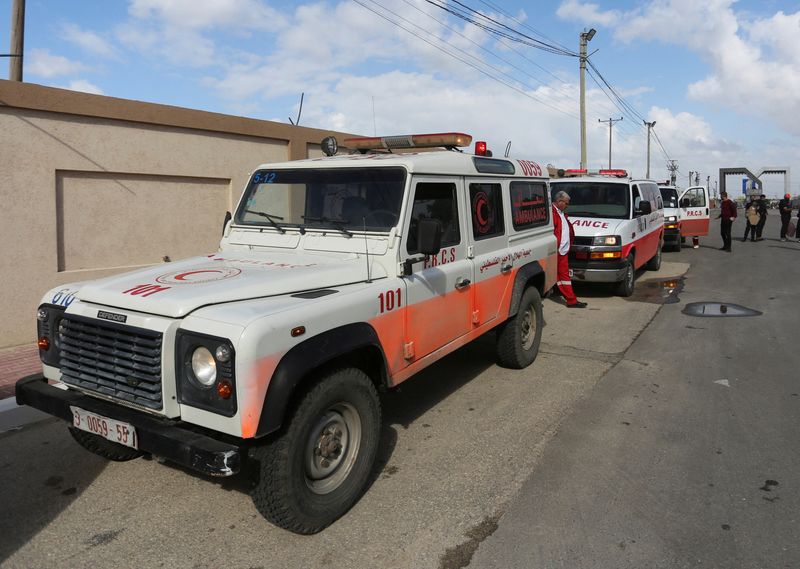UN agencies hope truce will allow aid to flow to northern Gaza
2023.11.24 11:49

© Reuters. FILE PHOTO: A man walks next to ambulances carrying premature babies, who were evacuated from Al Shifa hospital, before they are transported for treatment in UAE, at Rafah border crossing with Egypt, in Rafah, in the southern Gaza Strip, November 20, 2023
By Emma Farge, John Irish and Aidan Lewis
GENEVA (Reuters) -U.N. agencies voiced hope that a shaky truce that began between Israel and Hamas on Friday would allow for a ramping-up of aid and the first flows to northern Gaza in weeks as fresh hospital rescue efforts got under way.
Aid agencies have said they are aiming to deliver supplies to the northern part of the Palestinian enclave where hospitals have collapsed due to bombings and lack of fuel and where there are major concerns about dehydration and disease in a situation described as a siege within a siege.
But they say a more permanent ceasefire is required to deliver the mass amount of aid to address Gaza’s full needs, with nearly three-quarters of the population or some 1.7 million people displaced, thousands killed and many more — both dead and alive — thought to be trapped beneath the rubble.
“The north has suffered brutally so it’s one of our big priorities across U.N. agencies, irrespective of what the delivery is, is to get to the north,” said James Elder, a spokesperson for the U.N. children’s agency in Gaza.
UNICEF is aiming to get 30 trucks a day into Gaza during the truce and is prioritising delivering water and blankets, he said, describing scenes of people drinking salty water and sleeping in their cars with smashed-out windows.
He called for a longer period of sustained peace for children to recover physically and mentally, describing meeting a 7-year-old orphan who kept shutting his eyes so as not to forget his dead parents whose house was bombed.
“We cannot in all decent conscience go from a four or five day pause into killing of children again. I mean, that seems absolutely callous,” he told Reuters.
Asked whether the United Nations had guarantees from Israel that it could deliver aid to the north, Jens Laerke of the U.N. humanitarian office said: “We proceed on the basis of the hope and the expectation that we will reach people in need, where they are.”
Egypt says that during the truce 200 trucks will cross the Rafah crossing daily – more than double the recent average – and about twice the amount of fuel (130,000 litres), but it is not clear how the ramp-up is being managed.
That border crossing, intended for pedestrians, is the only one currently open and logistical limitations, bottlenecks and slow vetting processes have been constraining flows.
WHO spokesperson Christian Lindmeier said the agency was working on further hospital evacuations as soon as possible, voicing concern for some 100 patients and health care workers left in Al Shifa Hospital.
The Palestine Red Crescent said on social media that it had evacuated about 120 people from Ahli Baptist Hospital to Khan Younis in the south. It also received two new ambulances and 85 trucks with aid, it said.
Other aid groups were sceptical that the short pause would make a difference.
“For medical operations, a four-day pause is a band-aid not healthcare. This is not humanitarian access, it’s a joke,” said Joel Weiller, Director General at Medecins du Monde.








